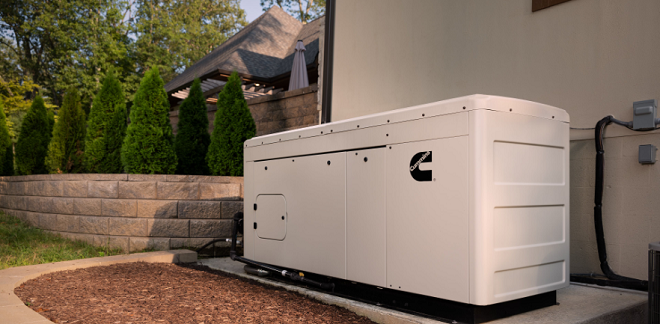Install a whole home generator!
Surviving a Heat Wave: A Guide for Homeowners in 2024
As global temperatures increase, the occurrence of heatwaves has become more frequent and severe. For homeowners, this means it's vital to understand how to stay safe and maintain a comfortable living environment during these periods of intense heat. This guide will provide you with valuable insights on how to navigate a heatwave, safeguarding you, your family, and your home.
KEY TAKEAWAYS
- Staying cool during a heat wave is challenging – especially if you encounter rolling blackouts or power outages.
- Follow this common-sense advice for staying cool during a hot summer.
- Plan ahead for power outages during hot summer weather by installing a whole-home backup generator.
Getting to Know Heat Waves
Defined as an extended spell of excessively hot weather, a heat wave is often accompanied by high humidity and limited rainfall. During such an event, the temperature significantly exceeds the region's average, making it challenging for the human body to cool down and potentially posing health risks.
Several factors contribute to heat waves, including high-pressure systems, a dearth of cloud cover, and static air masses. These conditions trap heat near the earth's surface, preventing it from dispersing and causing a rapid rise in temperature.
Characterized by their duration, intensity, and coverage, heat waves can persist for days or even weeks, with temperatures consistently reaching or exceeding a certain threshold. Particularly intense heat waves can push temperatures over 90 degrees Fahrenheit (32 degrees Celsius), which becomes especially dangerous when combined with high humidity levels.
While heat waves can strike any part of the globe, certain regions are more prone to them than others. In the United States, for instance, heat waves are more frequent in the Southwest and Southern states, where the climate is typically hot and dry. While other areas, such as the Midwest and Northeast, also experience heat waves, residents may be less acclimated to extreme heat.
Understanding the nature and effects of heat waves is crucial for safety during these extreme weather events. By recognizing the risks and taking precautions—like maintaining hydration, seeking shade, and using air conditioning—you can better protect yourself and your family from the hazards of a heat wave.
Heat Wave Preparedness for Homeowners
When a heat wave strikes, it's crucial to be ready to take necessary measures to stay safe and cool. As a homeowner, creating an emergency heat wave plan can help you and your family handle the scorching temperatures and ensure everyone's safety.
Begin by pinpointing the coolest areas of your home, such as a basement, a room with air conditioning, or a well-ventilated space. Ensure these areas are easy to access and stocked with essentials, including water, snacks, and necessary medications.
Establish a communication plan with your family or housemates. Set a rendezvous point in case you get separated and make sure everyone has everyone else's contact information. This will help you remain connected and informed during a heat wave.
Let's discuss keeping your home cool. One of the most effective methods to combat the heat is to use fans or air conditioning. If you have an air conditioning system, ensure it's functioning properly before the heat wave hits. If not, consider acquiring portable fans or window units to keep your living areas cool.
Moreover, create a cooling oasis by shutting curtains or blinds during the hottest parts of the day to block out the sun's rays. Use light-colored sheets and beddings to reflect heat and maintain nighttime comfort.
Install a Whole-Home Standby Generator
When you live in a hot climate, consider installing a whole-home back-up generator to help protect you and your family during a heat wave.

Power outages and brown-outs can occur frequently during extremely hot weather. You can insulate your home from utility power problems and keep your AC running by installing a whole-home back-up generator.
Schedule a free consultation with a Sears Home Services Backup Power Expert to begin the back-up generator installation process now.
Stay Hydrated
Hydration is key during a heat wave. Dehydration can set in quickly, particularly in high temperatures. Keep a stock of water or drinks rich in electrolytes at hand, and avoid excessive consumption of alcohol or caffeine, as they can exacerbate dehydration.
Remember, staying cool and hydrated is vital to surviving a heat wave. By developing an emergency plan, maintaining a cool home, and focusing on hydration, you can protect yourself and your loved ones from the dangers of extreme heat.
Heat Wave Safety: What Homeowners Need to Know
During a heat wave, it's crucial to take steps to stay safe and protect yourself from heat-related illnesses. Here are some essential tips for homeowners to manage extreme heat.
- Recognizing heat-related illnesses and their symptoms: It's important to be aware of the symptoms of heat-related illnesses like heat exhaustion and heatstroke. Symptoms can include dizziness, headache, nausea, rapid heartbeat, and confusion. If you or someone in your home experiences any of these symptoms, seek immediate medical attention.
- Clothing and sun protection: Wearing appropriate clothing and shielding yourself from the sun's harmful rays is key to staying safe in extreme heat. Choose lightweight, loose-fitting clothing that allows your skin to breathe. Use a wide-brimmed hat and sunglasses for added protection. Don't forget to apply sunscreen with a high SPF to exposed skin and seek shade whenever possible.
- Managing physical activity in extreme heat: Engaging in physical activity during a heat wave can put additional strain on your body. It's best to limit strenuous activities during peak heat hours, typically between 10 am and 4 pm. If you must exercise, aim to do it early in the morning or in the evening when temperatures are cooler. Stay hydrated by drinking plenty of water before, during, and after physical activity.
By adhering to these tips, you can minimize the risk of heat-related illnesses and stay safe during a heat wave. Remember, your health and well-being should always be a top priority, especially in extreme weather conditions.
Protecting Vulnerable Individuals During a Heat Wave
During a heat wave, it's crucial to take extra measures to protect vulnerable individuals such as infants, the elderly, and pets. Here are some tips to keep them safe.
Keeping Infants, Elderly, and Pets Safe
- Hydration is key: Ensure they have access to plenty of water throughout the day. Frequently offer small sips to infants and the elderly and always make sure pets have fresh water available.
- Avoid peak heat: Schedule outings or walks in the early morning or late evening when temperatures are cooler. This can help prevent heat-related illnesses.
- Dress appropriately: Dress infants and the elderly in lightweight, loose-fitting clothes. For pets, avoid exposing them to direct sunlight and provide them with a shaded area.
- Use fans or air conditioning: Maintain a cool and comfortable indoor environment. Use fans or air conditioning to control the temperature and provide a safe space for vulnerable individuals.
Identifying Signs of Heat Exhaustion in Children
It's important to recognize the signs of heat exhaustion in children, as they may not be able to communicate their discomfort effectively. Symptoms to watch for include excessive sweating, pale skin, fatigue, dizziness, and nausea. If you notice any of these signs, move the child to a cool place, provide fluids, and seek medical attention if symptoms worsen.
Creating a Cool and Safe Environment
Whether you're caring for infants, the elderly, or pets, it's vital to create a cool and safe environment during a heat wave. You can do this by:
- Blocking out direct sunlight with curtains or blinds.
- Keeping windows closed during the hottest part of the day.
- Using window coverings or reflective film to reduce heat transfer.
- Ensuring proper insulation and weatherstripping to prevent hot air from entering the house.
- Regularly maintaining and servicing your air conditioning unit to ensure it works efficiently.
By following these tips, you can protect vulnerable individuals and create a safe haven from the heat during a heat wave.
Keeping Your Home Comfortable During a Heat Wave
During a heat wave, maintaining a comfortable temperature in your home is essential. While air conditioning is the most efficient way to cool your home, there are other methods that can help you beat the heat. Here are some tips to help homeowners maintain a comfortable home without relying solely on AC.
Keep Your Home Cool Without Air Conditioning
- Block out heat by closing curtains and blinds during the day. Using light-colored curtains or reflective window film can also help minimize heat gain.
- Utilize natural ventilation by opening windows and doors during the cooler parts of the day. Strategically placed fans can also help create a cross breeze.
- Avoid using appliances that generate heat, such as ovens, stoves, and dryers, during the hottest parts of the day.
Insulate Windows and Reduce Heat Gain
- Install weatherstripping around windows and doors to seal any gaps and prevent hot air from leaking in.
- Apply window film or use thermal shades to reduce heat gain through windows. This can help insulate your home and keep it cooler.
- Consider using window awnings or external shades to block direct sunlight from entering your home.
Use Fans and Ventilation Effectively
- Position fans near windows to draw in cooler air from outside, creating a refreshing breeze throughout your home.
- Use ceiling fans or portable fans to circulate air and create a more comfortable environment.
- Consider a whole-house fan, which can help cool your home by drawing in cooler air from outside and expelling hot air through the attic.
By employing these strategies, you can keep your home cooler during a heat wave and survive a heat wave.
Install a whole home generator!
Have a backup when the power goes out. Get a free estimate so your home is prepared for the next power outage.
Was this information helpful?
Improve Generator Resources
Ensure uninterrupted power on game day with a reliable home generator.
Don't be left in the dark! Embrace the spirit of the solar eclipse and the importance of backup electrical power.
Find out the best brand of whole home generator at Sears Home Services.
Find the ideal size of back-up generator for your home at Sears Home Services. Our experts will help you determine the perfect generator for your needs.
